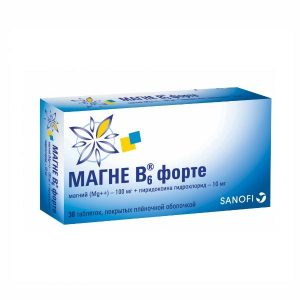Description
Release form
Tablets.
Packing
Per pack 10 pcs.
Pharmacological action of
Ascorbic acid has pronounced reducing properties, is involved in the regulation of carbohydrate metabolism, redox processes, blood coagulation, normalization of capillary permeability, tissue regeneration, synthesis of steroid hormones, collagen, procollagen.
Pharmacokinetics
Communication with plasma proteins – 25%. The concentration of ascorbic acid in plasma is normally approximately 10 to 20 μg / ml. It easily penetrates into white blood cells, platelets, and then – in all tissues, the highest concentration is achieved in glandular organs, white blood cells, liver and lens of the eye penetrates through the placenta. The concentration of ascorbic acid in leukocytes and platelets is higher than in red blood cells and in plasma. In deficient conditions, the concentration in leukocytes decreases later and more slowly and is considered as a better criterion for assessing deficiency than plasma concentration.
Metabolized mainly in the liver to deoxy-ascorbic acid and then to oxaloacetic acid and ascorbate-2-sulfate.
It is excreted by the kidneys, through the intestines, with sweat, breast milk unchanged and in the form of metabolites. With the appointment of high doses, the rate of excretion increases dramatically. Smoking and the use of ethanol accelerate the destruction of ascorbic acid (conversion into inactive metabolites), drastically reducing body reserves. It is excreted during hemodialysis.
Indications
Prevention and treatment of hypo- and vitamin deficiency vitamin C
As an adjuvant: hemorrhagic diathesis, nasal, uterine, pulmonary and other bleeding, against the background of radiation sickness an overdose of anticoagulants, infectious diseases and intoxications, liver disease, pregnant nephropathy, Addison’s disease, sluggishly healing wounds and bone fractures. dystrophy and other pathological processes.
The drug is prescribed for increased physical and mental stress, during pregnancy and breastfeeding, during recovery from severe long-term illnesses.
Contraindications
Hypersensitivity, with prolonged use in large doses (more than 500 mg) – diabetes, hyperoxaluria, nephrolithiasis, hemochromatosis, thalassemia, glucose-6-phosphate dehydrogenase deficiency.
Precautions
Sideroblastic anemia, urolithiasis.
Use during pregnancy and lactation
During pregnancy and lactation, it is used only if the expected benefits to the mother outweigh the potential risk to the fetus and the baby. The minimum daily requirement for ascorbic acid in the II-III trimesters of pregnancy is about 60 mg. It should be borne in mind that the fetus can adapt to high doses of ascorbic acid, which is taken by a pregnant woman, and then the withdrawal syndrome may develop in the newborn. The minimum daily need for lactation is 80 mg.
Maternal diet
Special instructions
Used as directed by a doctor. Ascorbic acid is prescribed orally (after eating). For preventive purposes, adults are prescribed 0.05 g-0.1 g per day during pregnancy, in the postpartum period and in the case of a low vitamin C content in the milk of nursing women, 0.3 g per day is prescribed for 10-15 days, then prophylactically at 0, 1 g per day for the entire period of lactation. Children are prescribed prophylactically at 0.025 g 2-3 times a day. Therapeutic doses for adults are, when taken orally, – 05-0.1 g 3-5 times a day for children – 0.05-0.1 g 2-3 times a day.
The course of treatment depends on the nature and course of the disease.
Composition
1 tablet contains: active substance: ascorbic acid 25 mg
Dosage and administration
containing an adequate amount of ascorbic acid
Side effects of
are sufficient to prevent its deficiency in the infant. Theoretically, there is a danger to the child when the mother uses high doses of ascorbic acid (it is recommended not to exceed the daily requirement for ascorbic acid by the nursing mother).
Drug interactions
From the central nervous system: with rapid intravenous administration – dizziness, feeling tired, with prolonged use of large doses (more than 1 g) – headache, increased excitability of the central nervous system, insomnia.
From the urinary system: moderate pollakiuria (when applying a dose of more than 600 mg / day), with prolonged use of large doses – hyperoxaluria, nephrolithiasis (from calcium oxalate), damage to the glomerular apparatus of the kidneys.
On the part of the cardiovascular system: with prolonged use of large doses, a decrease in capillary permeability (possibly worsening trophic tissue, increased blood pressure, hypercoagulation, the development of microangiopathies).
Allergic reactions: allergic reactions up to the development of anaphylactic shock.
Laboratory indicators: thrombocytosis, hyperprothrombinemia, erythropenia, neutrophilic leukocytosis, hypokalemia, glucosuria.
Other: with prolonged use of large doses (more than 1 g) – inhibition of the function of the insular apparatus of the pancreas (hyperglycemia, glucosuria), with intravenous administration – the threat of abortion (due to estrogenemia), erythrocyte hemolysis.
Overdose
Due to the stimulating effect of ascorbic acid on the synthesis of corticosteroid hormones, it is necessary to monitor the function of the adrenal glands and blood pressure. High doses of ascorbic acid enhance the excretion of oxalates.
Storage Conditions
In a dark place at a temperature not exceeding 25 ° C.
Shelf life
2 years.
Deystvuyushtee substance
Askorbinovaya kislota
dosage form
lozenges
Possible product names
Ascorbic acid twist Watermelon, 10 pcs.
Askoprom, Russia


